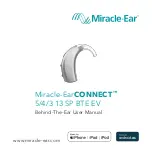
A new Beltone hearing instrument
Congratulations on your choice of a Beltone hearing instrument.
This is an important step towards clearer hearing and better
understanding. We have used all our experience with hearing
instruments to help you communicate, lead an enjoyable social
life and listen to the world around you.
Your hearing instrument is a very advanced device. Your hearing
care practitioner has tuned it to your individual needs. With a little
devotion and patience you will become familiar with it.
This booklet is a short guide to assist you in getting acquainted
with your hearing instrument. Read it carefully and use it as a
guideline.
We wish you happiness and pleasant listening with your new
instrument.
Beltone



































